"Clearly no two antidepressants are built the same."
Side effects of antidepressants have been ranked for the first time, revealing major differences in how medications affect the body.
Academics at King’s College London and the University of Oxford studied how common antidepressants influenced weight, heart rate and blood pressure within the first eight weeks of treatment.
The results, published in The Lancet, showed some patients gained up to 2kg in that time, while others lost weight. Heart rates varied by as much as 21 beats per minute depending on the drug.
Around eight million people in the UK take antidepressants. Researchers warned these differences could affect people’s overall health and whether they continue taking their medication.
They stressed that nobody should stop their treatment without medical advice, but called for prescriptions to be more closely matched to individual needs.
Professor Oliver Howes said: “There are big differences between [antidepressants] and this is important not just for individual patients, but large numbers of people are taking them, so even modest changes could have a big effect across the whole population.”
The team analysed 151 studies of 30 drugs used to treat depression, involving more than 58,500 patients.
Dr Atheeshaan Arumuham, of King’s College London, said:
“We’ve always known antidepressants affect physical health.
“Clearly no two antidepressants are built the same.”
He added that the differences could become clinically important, raising the risk of conditions such as heart attack or stroke.
Dr Toby Pillinger told BBC Radio 4’s Today programme: “The majority of the studies we looked at were relatively short.
“We’re looking at eight weeks’ duration and still within that duration, we were seeing large changes in physical health parameters, which we would argue have clinical relevance.
“The last thing I want is for this story to be scaring people.
“I want to see this as empowering individuals to take the initiative and to engage in shared decision-making with their practitioner.”
Antidepressants with Most Weight Gain
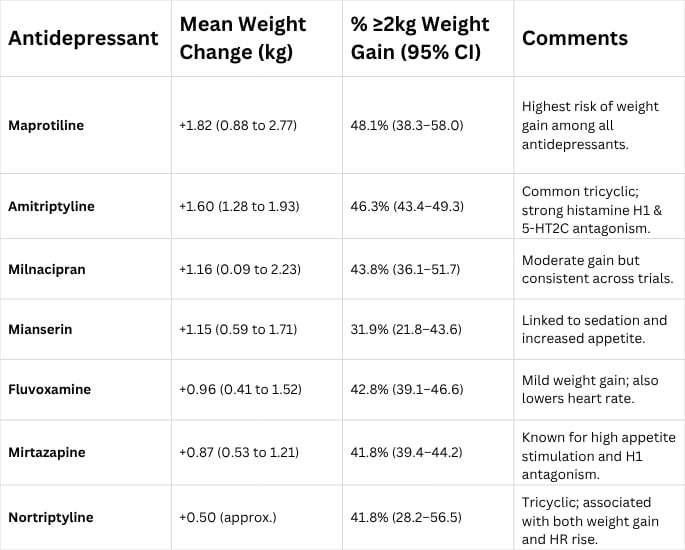
Some antidepressants were linked to significant increases in body weight.
Maprotiline caused the most weight gain, with patients putting on nearly 2kg in eight weeks. Amitriptyline followed closely, with an average rise of 1.6kg.
The study found mirtazapine, milnacipran and fluvoxamine also led to noticeable gains.
By contrast, most SSRIs, including citalopram, escitalopram and sertraline, were linked to smaller changes in weight.
Researchers said that while amitriptyline raised weight, heart rate and blood pressure, it also helped patients struggling with pain and insomnia.
They said: “It is too simplistic to say there are good and bad antidepressants.
“Even though amitriptyline increases weight, heart rate and blood pressure it also helps with pain and struggling to sleep.”
Antidepressants with Most Weight Loss
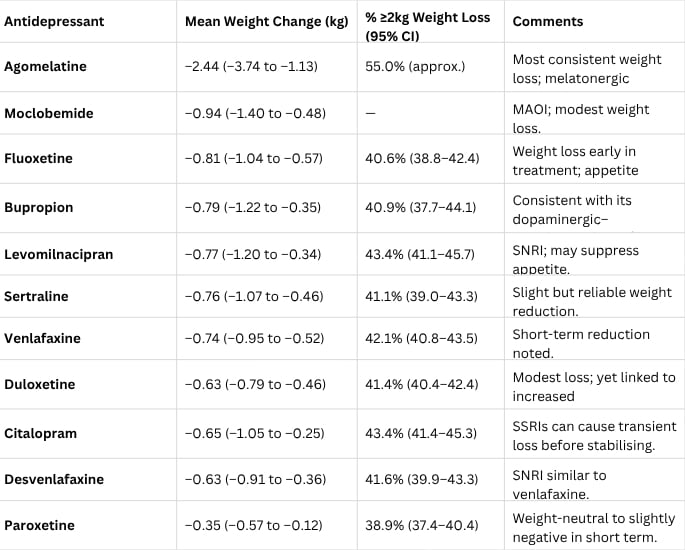
Agomelatine was found to have the opposite effect, producing an average 2.4kg weight loss over the same period.
Fluoxetine, known by its brand name Prozac, also reduced weight slightly, as did bupropion and duloxetine.
The findings suggest newer antidepressants, such as agomelatine and bupropion, may be better suited for patients concerned about weight gain, although researchers cautioned that response varies by individual.
Antidepressants Impacting Blood Pressure
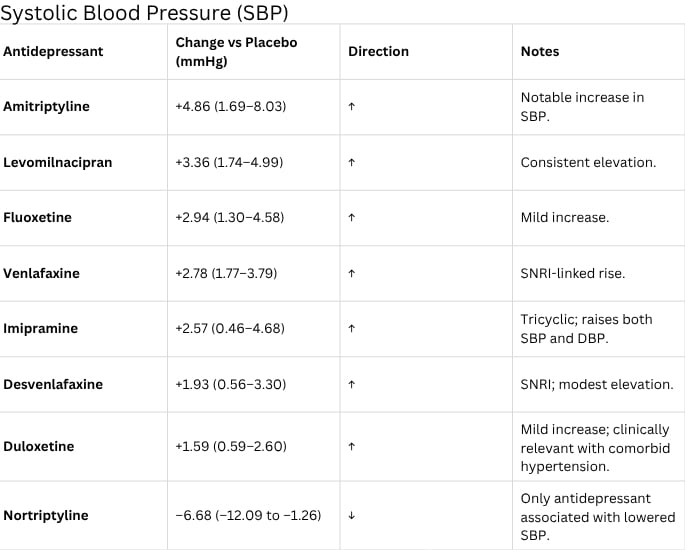
The study found large variations in blood pressure.
Nortriptyline and doxepin showed an 11 mmHg difference in systolic blood pressure between them, with nortriptyline causing a drop and doxepin an increase.
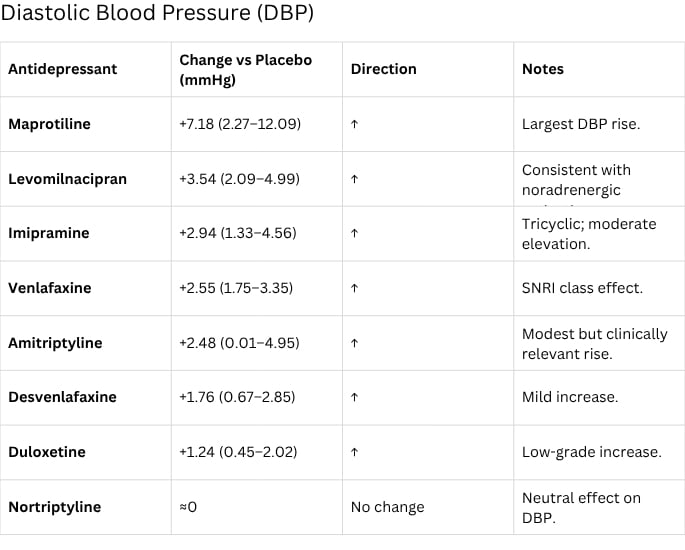
Amitriptyline, levomilnacipran and venlafaxine were all linked to higher blood pressure. Duloxetine and desvenlafaxine also caused moderate increases.
The authors said the differences were “clinically relevant”, particularly for those with existing cardiovascular risks.
Antidepressants Impacting Heart Rate
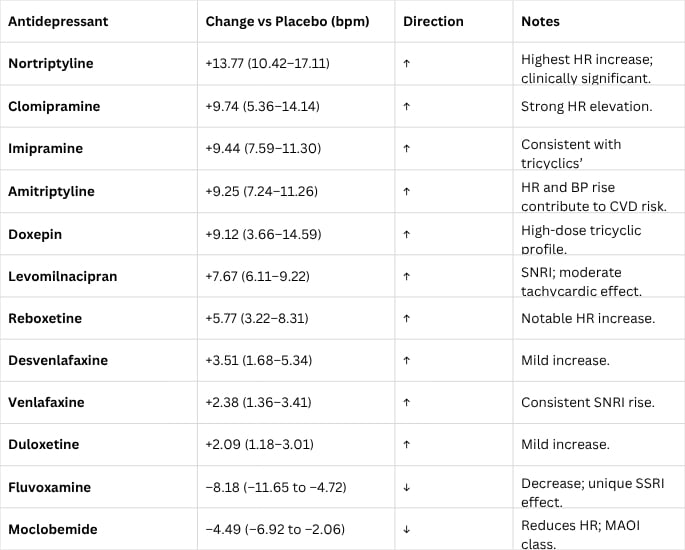
Heart rate effects varied widely.
Fluvoxamine slowed the heart rate, while nortriptyline accelerated it by more than 20 beats per minute. Clomipramine, amitriptyline and doxepin also increased heart rate significantly.
Reboxetine, desvenlafaxine and venlafaxine caused smaller rises, while moclobemide slightly reduced heart rate.
Researchers said these effects could matter for patients with underlying heart conditions or those already taking medication for cardiovascular disease.
Overall, SSRIs such as paroxetine, citalopram, escitalopram and sertraline were found to have fewer physical side effects compared with tricyclics and SNRIs.
Fluoxetine was linked to both a slight drop in weight and a small rise in blood pressure, reinforcing how side effects differ between drugs.
Professor Andrea Cipriani from the University of Oxford said it was “impossible” to say how many of the millions of people being prescribed antidepressants should be on a different drug.
However, he noted that the NHS’s reliance on generic, low-cost SSRIs limited personalisation.
Professor Cipriani said: “There has been a push for ‘generic, cheap medications’ that meant 85% of antidepressant prescriptions in the UK were for just three drugs: the SSRIs citalopram, sertraline and fluoxetine.
“Implementing the findings of this report would see the 85% reduce dramatically with more people accessing better treatments.”
The researchers are now developing a free online tool to help doctors and patients choose the right antidepressant, though this would require wider cultural change within the NHS.
Dr Prasad Nishtala, from the University of Bath, who was not involved in the study, said the findings were “novel and valuable”.
He said: “In a real-world setting, where patients often receive antidepressants for months or years, the cumulative risks are likely to be higher, particularly among those with chronic depression.”






























































